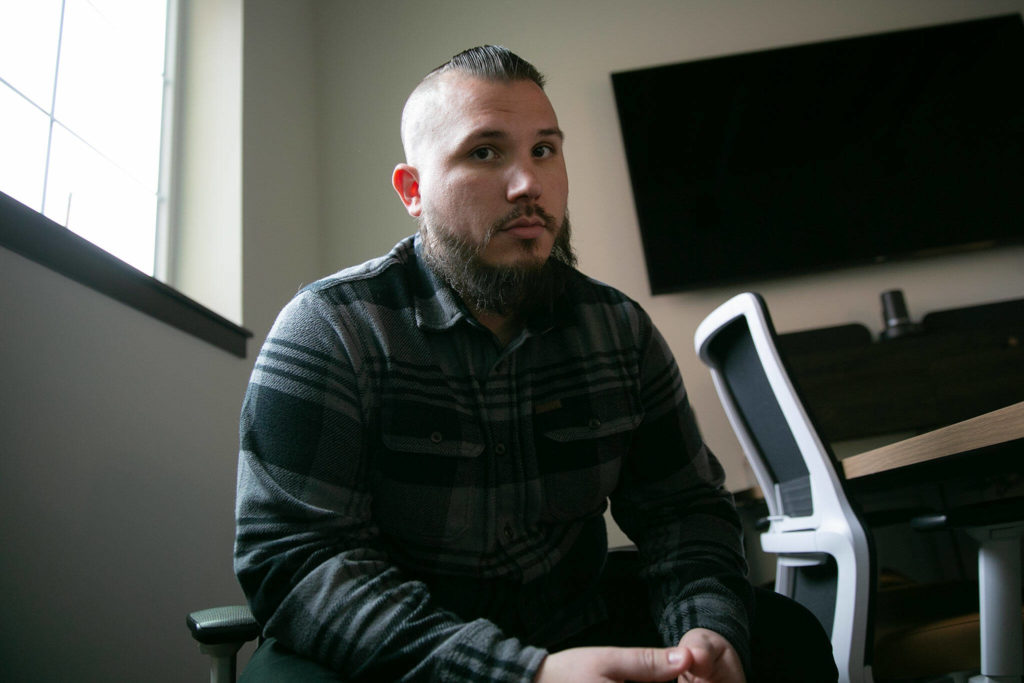EVERETT — Nathanael Engen hopes to grow green mushrooms in downtown Everett.
By green, Engen, the founder of Black Forest Mushrooms, means locally grown gourmet mushrooms.
With his venture, he hopes to take a bite out of the mushroom industry’s carbon footprint.
It’s a long journey from fungi to fork for some gourmet mushrooms.
Many are grown in China — one of the world’s largest mushroom producers — and then shipped to the United States via cargo jet.
“That’s a lot of unnecessary emissions,” said Engen, an Air Force veteran who founded his company, Black Forest Mushrooms, last summer.
A more sustainable solution, one that saves on jet fuel and offers faster delivery, is to cultivate them locally, he said.
To make it happen, he hopes to turn a 3,000-square-foot warehouse in downtown Everett into a combination mushroom farm, retail store and demonstration kitchen.
Savory blue oyster mushrooms, sweet, nutty-flavored chestnut mushrooms, and lion’s mane, a mushroom that can taste like seafood, are some of the varieties he hopes to cultivate.
He’s just getting started. The building must first undergo an extensive renovation, he said.
He hopes to hire staff and get growing by mid-year.
In the meantime, Engen has leased an office at Think Tank Co-Work, a new co-working space in Everett at 2817 Wetmore Ave. in Everett.
Urban setting
Downtown Everett is the right place for an indoor mushroom farm, Engen said.
“We could have easily gotten property way out in the middle of nowhere, but we purposefully chose this location to be close to the community,” Engen said. “We want people to stop in and pick up their mushrooms for dinner that night.”
The Downtown Everett Association has given Engen’s venture a very green thumbs up.
“Nathanael has been selling high quality, culinary mushrooms at local farmers markets — and selling out,” said Liz Stenning, the association’s executive director.
“It will be a draw for people,” Stenning said. “People will not only be able to buy fresh mushrooms but stop by and see how they’re produced. We think this venture will be a success.”
Engen, who grew up in Auburn, began growing mushrooms during the COVID-19 pandemic inside a small garage at his Everett home.
But coaxing a mushroom from the mycelium, the thread-like fungal network that dwells underground, is tricky business.
(Mushrooms are like the fruit of the fungus.)
Unlike the cornucopia of greenery cultivated indoors, mushrooms can only flourish under specific conditions.
Still, Engen saw a growing demand for gourmet mushrooms, which have found their way into more recipes, home kitchens and restaurants.
Standard supermarket fare usually consists of white button mushrooms, brown cremini mushrooms, perhaps shiitake or portobello.
Determined to up the ante, Engen plans to introduce consumers to king trumpet mushrooms, enoki, pink and yellow oyster among other varieties.
Still, growing mushrooms was, at first, a leap for Engen, a self-described lifelong entrepreneur, whose last business focused on the music industry.
“I am passionate about music. But my last business — concert production — did not work out,” Engen said.
As he pondered his next enterprise, he wanted to offer a product that would fulfill an existing demand. The passion could come later.
Indoor agriculture — known as controlled environment agriculture — caught his eye.
Farming methods that can offset the agricultural industry’s heavy carbon footprint, in particular, piqued his interest, he said.
He’s in the right place to look. Snohomish County is home to two indoor farming ventures that nurture crops indoors under LED lights. Both companies say their indoor grows produce higher yields and use less water and fertilizer than traditional outdoor farms.
Infarm launched an indoor growing center at an Everett business park more than three years ago.
The German company employs a water-based hydroponic system to make its vertical garden grow. Because its system recycles and recaptures the moisture that evaporates from the plants, it takes less than 7 ounces of water to irrigate a pound of herbs over its growth cycle.
In a warehouse at the Cascade Industrial Center in Marysville, Virginia-based Soli Organic is about to open an organic vertical farm. Its soil-based system will allow its crops to be certified organic.
Both companies produce fresh herbs and salad greens for grocery stores, restaurants and food distributors.
Time to Grow
Engen decided to try his hand at growing greenery indoors. He installed grow lights and plant racks in his living room.
It worked! His yield included tomatoes, zucchini and herbs.
But while they made for a yummy salad, there wasn’t enough there to create a business, Engen said.
“When I was doing all the research on controlled agriculture environments, one topic that kept popping up was mushrooms,” he said.
“I thought maybe I can grow some mushrooms. I had never grown mushrooms. They aren’t like growing tomatoes or zucchini indoors where you set up some equipment, add some dirt, the right nutrients and check your pH levels.
“Mushrooms are completely different because they’re a fungi,” he said. “You need special equipment. You need a sterile environment because otherwise you’ll cultivate other molds.”
For this experiment, he moved from the living room to a 300-square-foot garage. When it proved successful, Black Forest Mushrooms was born.
So far, consumer response has been good, Engen said.
“We took our products to the Snohomish Farmers Market in June and they sold out in two hours,” he said.
“It’s easy to grow a few pounds of mushrooms,” he said. “The gourmet mushroom trade is a hard business to scale for most people.”
The addition of the Everett warehouse space, a ten-fold increase in space, will make it easier to boost the harvest.
Engen sees a bright future for his company’s low-light crops. “It’s time to expand,” he said.
Janice Podsada: 425-339-3097; jpodsada@heraldnet.com;
Talk to us
> Give us your news tips.
> Send us a letter to the editor.
> More Herald contact information.



























